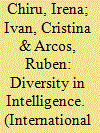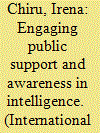| Srl | Item |
| 1 |
ID:
188282


|
|
|
|
|
| Summary/Abstract |
With the advent of new technologies and the accelerated changes in the security arena, it has become apparent that intelligence organizations need to develop learning, self-reflective, and competitive working environments and communities of practice with a distinct set of values and norms that may go beyond the cultural values and practices of the twentieth century. One of the values that needs to be further explored and integrated is diversity. A look at the literature and policies in the field shows that in certain parts of the world, consistent steps have been made toward investigating the implications of diversity and inclusion as setting goals for reconceptualizing human resources and internal culture strategies. This introductory study aims to introduce readers to the current debates on diversity and inclusion, as well as offer a short glimpse at the question.
|
|
|
|
|
|
|
|
|
|
|
|
|
|
|
|
| 2 |
ID:
145320


|
|
|
|
|
| Summary/Abstract |
In democracies the efficiency of a national security institution depends significantly on the way its role and mission are perceived by the intelligentsia and the general public. “Social capital,” an asset for all institutions, conditions their efficient functioning in the limits of the law. Consequently, the intelligence culture, understood as a set of explicit and implicit attitudes and behaviors related to intelligence which influence social perceptions, is fundamental for allowing the public to trust and support their country's intelligence services, given that trust is directly correlated with the efficiency of national security institutions. Political as well as security community legitimacy is acquired, preserved, validated, or eroded through actions, just as their public image is built through adequate communication policies.
|
|
|
|
|
|
|
|
|
|
|
|
|
|
|
|